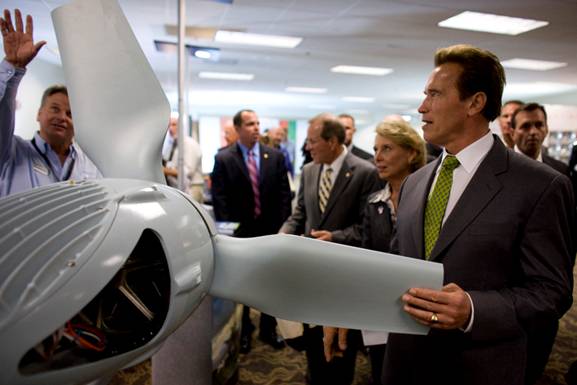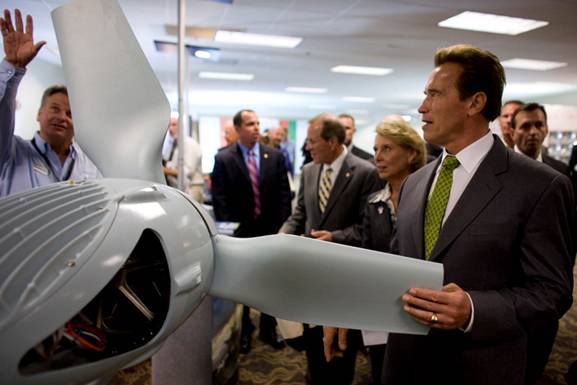 Photo: Peter GrigsbyGov. Arnold Schwarzenegger and his best buddies from around the world flexed their muscles at the second annual Global Climate Summit in Los Angeles this week. Actor Harrison Ford, chimp expert Jane Goodall, and a slate of A-list dignitaries from 70 countries packed a Century City luxury hotel to debate how best to fend off the end of the world as we know it.
Photo: Peter GrigsbyGov. Arnold Schwarzenegger and his best buddies from around the world flexed their muscles at the second annual Global Climate Summit in Los Angeles this week. Actor Harrison Ford, chimp expert Jane Goodall, and a slate of A-list dignitaries from 70 countries packed a Century City luxury hotel to debate how best to fend off the end of the world as we know it.
“We need a lot of muscle to beat this climate change,” said Schwarzenegger in his opening remarks. “That’s why I’m here today, to pump you up … Because while all those national governments are debating over who should go first … we on the regional level are already creating the action … we are where the action is.”
Despite the climate legislation introduced by Sens. John Kerry and Barbara Boxer the day the Summit began, the focus throughout the event was on “sub-nationals;” that is, the cities, states, and provinces that may not enjoy national government status, but have been taking concrete steps to curb greenhouse gas emissions and promote energy efficiency.
Governors from Oregon, New York and Washington State joined the more than 1,000 regulators, environmentalists, and green business types from six different continents.The global networking had some positive results. At the request of the U.S. State Department, California will work with a remote Chinese province to recreate many of the state’s climate programs there.
Some partnerships drew criticism, however. Timber king Sierra Pacific Industries, California’s largest private landowner, announced a deal with the New York-based carbon credit company Equator, LLC that will allow Equator to market credits for “sequestering” 1.5 million tons of carbon in 60,000 acres of forest. Sierra and Equator likened their arrangement to removing 300,000 cars from the road for one year. Schwarzenegger hailed it as the nation’s largest carbon sequestration project. But environmental groups called the deal a sham, made possible by language that was slipped into California’s revised forestry protocols last week and that will allow timber giant Sierra to continue its clear-cutting and other harmful practices. A state official disagreed, saying there was no last minute move, and that clear cutting would in fact be somewhat restricted under the new rules.
Divisions between developed and developing countries were also on display at the Los Angeles Summit. Yannick Glemarec, a United Nations director of environment finance from France, spoke proudly of rigorous new building codes in Paris, while panelists from impoverished small coastal nations described the climate-related droughts, flooding, and rising seas that are already punishing them. “For us, it is a choice between survival and death,” said Dessima Williams, Ambassador of Grenada to United Nations and Chair of the Alliance of Small Island States.
According to Mary DeNevers of the World Bank, it could take as much as $100 billion annually to address these and other impacts of climate change. The sum, said DeNevers, is actually quite small compared to the world’s collective wealth. But she said that one of the most contentious negotiating points for Copenhagen delegates in a global climate agreement is whether developed nations should pick up that tab in addition to the poverty assistance already offered to developing nations — or in place of it.
Some speakers took note of the ironies in the way developed and developing nations view the crisis. “You’re worried about your Bordeaux or your Pinot” suffering from rising temperatures, but “these people are worried about how to get protein,” said Stephen Schneider, a Stanford University professor and member of the Intergovernmental Panel Climate Change (IPCC), addressing the French U.N. representative. He also said that if members of the U.S. Congress were willing to spend $750 billion to bail out “greedy bankers,” they should step up to bail out starving nations grappling with drought and crop loss.
All the attendees got a tiny taste of life without first world amenities on Thursday, when power at the Hyatt Regency Century Plaza went out for more than two hours. No working lights or laptops, and worst of all, no air conditioning on a smoggy, 90 degree L.A. afternoon.
“Yeah, everybody’s behaving very sustainably, climbing the stairs instead of using the elevators,” quipped construction lobbyist Tom Carter, who was trolling the summit in for clients for his startup company, which turns captured carbon dioxide into “green cement.”
Carter and other attendees didn’t come to Schwarzenegger’s summit just for the speakers. They were there for the action in the hallways. Carter hadn’t sealed any deals, he said, but he’d met lots of potential new customers.
There was a kerfuffle over the latest “green washing” ads aired in Virginia this week by CO2isgreen.org, a Washington, D.C.-based group. The ads claim there is no cataclysmic, human caused climate change occurring, and that more carbon dioxide should be created because it is good for plants. Jane Goodall called the ads “disgraceful.” Larry Schweiger, president of the National Wildlife Federation, believes the ads are intended to persuade Virginia congressmen not to vote for national climate legislation.
For many attendees, including lobbyist Tom Calera, a conference highlight was hearing Environmental Protection Agency administrator Lisa Jackson announce her first potential effort to regulate greenhouse gases from power plants and refineries. “More potential customers for us,” said Calera, noting all those power plant behemoths who might soon need a company like his to take a little carbon off their hands.
Nancy Sutley, Obama’s director of the Council on Environmental Quality, was also on hand. The former deputy mayor of Los Angeles said that while many federal officials thought regional efforts like the Western Climate Initiative — an agreement among U.S. western states and some Canadian provinces — should be superceded by national cap and trade legislation, she thought perhaps they could be integrated.
Schwarzenegger and other conferees would certainly agree. While grateful for any efforts on the part of their respective national governments, they were not about to call it quits on climate. On the last day of the conference delegates planned to sign two joint declarations. One demands that deforestation be addressed at the Copenhagen climate treaty negotiations in December, the other that the mighty sub-nationals be included in the international climate conversation.
“Our experience and our expertise are essential to the climate talks that will begin in just two months in Copenhagen,” said Gov. Schwarzenegger, who said he will travel to the Danish capitol to speak on behalf of the sub-national movement. “We will give the findings from this summit to the U.N. climate change negotiators to help them with their work in December. They will hear our voices in Copenhagen, believe me. We are where the action is.”
—
Video: Janet Wilson interviews Stanford’s Stephen Schneider at the Governor’s Global Climate Summit



